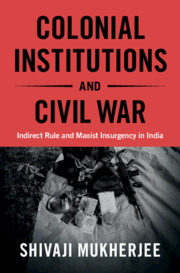Book contents
- Colonial Institutions and Civil War
- Cambridge Studies in Contentious Politics
- Colonial Institutions and Civil War
- Copyright page
- Contents
- Figures
- Tables
- Acknowledgments
- Part I Theory
- Part II Qualitative and Quantitative Testing
- 4 Qualitative Analysis of Maoist Strategy and Rebel Agency
- 5 Quantitative Testing of Effects of British Indirect Rule on Maoist Insurgency
- 6 Colonial Choice or Random Contingency? Addressing Selection Bias in British Indirect Rule
- 7 Maoist Insurgency in Chhattisgarh: The Raja of Bastar and Tribal Rebellion
- 8 Maoist Insurgency in Andhra Pradesh: The Nizam’s Shadow on Telangana
- Part III Generalizability
- Bibliography
- Index
- Series page
5 - Quantitative Testing of Effects of British Indirect Rule on Maoist Insurgency
from Part II - Qualitative and Quantitative Testing
Published online by Cambridge University Press: 15 May 2021
- Colonial Institutions and Civil War
- Cambridge Studies in Contentious Politics
- Colonial Institutions and Civil War
- Copyright page
- Contents
- Figures
- Tables
- Acknowledgments
- Part I Theory
- Part II Qualitative and Quantitative Testing
- 4 Qualitative Analysis of Maoist Strategy and Rebel Agency
- 5 Quantitative Testing of Effects of British Indirect Rule on Maoist Insurgency
- 6 Colonial Choice or Random Contingency? Addressing Selection Bias in British Indirect Rule
- 7 Maoist Insurgency in Chhattisgarh: The Raja of Bastar and Tribal Rebellion
- 8 Maoist Insurgency in Andhra Pradesh: The Nizam’s Shadow on Telangana
- Part III Generalizability
- Bibliography
- Index
- Series page
Summary
In this chapter, I test the theory of the effect of colonial indirect rule on postcolonial insurgency using an all-India district-level dataset. I use unique Ministry of Home Affairs (MHA) data as a measure of the dependent variable of Maoist control. Unlike other quantitative studies of Maoist insurgency that use measures of violence from 2005 to 2010 as their dependent variable, I do not use such violence data as my dependent variable since violence is only the most visible aspect of insurgency and does not measure actual Maoist rebel control, which is a more multidimensional concept. There is potential bias in the OLS regression estimates since the British possibly selected those districts for indirect rule that were worse off in terms of revenue and productivity. To correctly estimate the causal effect of colonial indirect rule, I control for some observable pre-colonial determinants of indirect rule choice, like forest cover, terrain, soil quality, and pre-colonial agrarian rebellion and find that princely state is still a statistically significant predictor of Maoist control. While these pre-colonial qualities may have played a role in the choice of institutions, once in place such colonial indirect rule had an independent causal effect on postcolonial insurgency.
Keywords
- Type
- Chapter
- Information
- Colonial Institutions and Civil WarIndirect Rule and Maoist Insurgency in India, pp. 113 - 135Publisher: Cambridge University PressPrint publication year: 2021



